

2022–23
Annual Report
The Scottish Graduate School for Arts & Humanities (SGSAH) launched in 2014. The world’s first national graduate school for the Arts & Humanities, our mission is to work together to inspire researchers who are talented, caring, ethical and reflective professionals with a demonstrable commitment to generating and mobilising knowledge across a range of scholarly, professional and public communities.

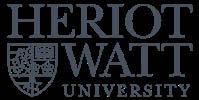

SGSAH is a partnership of seventeen Higher Education Institutes (HEIs), sharing our resources to enrich the doctoral training environment and enhance the doctoral experience. Working with our supporters in the arts, culture, creative and heritage sectors, we support positive connections and productive networks locally, regionally and globally to provide outstanding opportunities for doctoral researchers in Scotland.














Members


Funders

2
Cover photo © Cameron Brisbane for the British Council
Contents Director’s Welcome 4 SGSAH Research 6 Partnership PhDs 8 Engagement Fund 12 Cohort Development Fund 14 AHRC Postdoctoral Fellowship Scheme 16 Events & Training Spotlights 18 Discipline+ Catalysts 20 Knowledge Exchange Hubs 23 Summer School 24 Research Showcase 26 Equality, Diversity & Inclusion 28 SGSAH in the World 30 Global Connects International Programme 31 EARTH Scholarships 32 Research Internships & Artists Residencies 34 SGSAH People 38 Our Doctoral Researcher Committee (DRC) 39 Our Alumni 40 Our Staff 42 3
Director’s Welcome

It’s been another busy year at SGSAH, and we’re delighted to be bringing you this, our third annual report detailing some of our key activities, alongside achievements of our PhD researchers and alumni.
This year in particular has seen SGSAH’s global reach grow. With funding from British Council Scotland, we established the EARTH Scholarships, a programme which brings PhD and Early Career Researchers from around the world to Scotland to work with academic mentors at our seventeen member HEIs on research projects in the environmental Arts & Humanities. The programme aligns with SGSAH’s GREEN/GRADUATE strategy, and will run again in 2024. You could find out more about the programme later in the report.
At the same time, we have enabled SGSAH PhD researchers to set off on travels around the globe, to carry out primary research including fieldwork and archival visits, and as visiting doctoral researchers spending several months at international universities. The richness of these intellectual and intercultural exchanges are unparalleled experiences we can offer through our AHRC and SFC funding, and significantly contribute to PhD researchers’ career development. That said, we also offer plenty of training opportunities in Scotland and online, to our funded cohorts as well all Scotland-based PhD researchers in the Arts & Humanities, no matter what their funding source.
Meanwhile, the staff team at SGSAH is growing. You can read more about our new colleagues within these pages, and also about the crucial Equality, Diversity and Inclusion (EDI) work we’re undertaking, fronted by our EDI Lead.

What’s next for SGSAH? Well, 2024 will mark our 10th anniversary: a decade of funding, training and supporting PhD researchers! We’re looking forward to celebrating that anniversary. If you’re one of our alumni, please do make sure we can be in touch with you - see details of how to do this in our Alumni section. More generally, our communications include our monthly newsletter, Twitter, Instagram and LinkedIn, our website, blog and online research showcase, as well as individual staff email contacts.
We’re looking forward to hearing from you, and letting you know about our plans...
Professor Claire Squires September 2023
4
‘Since its establishment in 2014, SGSAH has become an absolutely vital source of training, guidance and support for doctoral researchers in the Arts & Humanities. It has done this by providing a vibrant, innovative and inclusive interdisciplinary community not only for postgraduate researchers, but also for academics and external partners. In this way, SGSAH has fostered a deep consideration of cross-institutional collaboration in the Scottish doctoral landscape.’
Professor Jo Gill Co-Chair of the SGSAH Board
5
SGSAH Research
With the support of the Arts & Humanities Research Council (AHRC) and the Scottish Funding Council (SFC), SGSAH funds doctoral research across the full range of Arts & Humanities disciplines.
New projects for 2022-23 include investigations of Scotland’s diabetics, in terms of patientconsumerism and the doctor-patient relationship within state funded healthcare in the midtwentieth century; the concept of ‘Haneen’ - an Arabic term, meaning nostalgia/longing - as an enduring force in Palestinian culture, explored through creative praxis; landscape transformations and heritage discourses in the Kurdish Lowlands of Iraq and in the Zagros highlands of Iran; the experience and treatment of fatness in early modern France (c.1500 – 1700); and accent biases, with specific focus on working-class Glaswegian vernacular.
Our PhD researchers work with world-leading academics, frequently in cross-HEI supervisory teams, creating the best possible research and training environments.
Through our Collaborative Doctoral Awards (CDAs) and Applied Research Collaborative Studentships (ARCS), some of our PhD researchers also work in partnership with external organisations, including The Alasdair Gray Archive, the British Board of Agrément, Comunn Eachdraidh Nis, Creative Scotland, Historic Environment Scotland, the National Library of Scotland, National Museums Scotland, the National Theatre of Scotland, Planning Aid for Scotland, the Royal Botanic Garden Edinburgh, Scottish Book Trust, the Traverse Theatre, and the Woodland Trust. We support our researchers to conduct their research and present it to a range of audiences and enable PhD researchers across Scotland to work with each other with funding to design and run their own events.
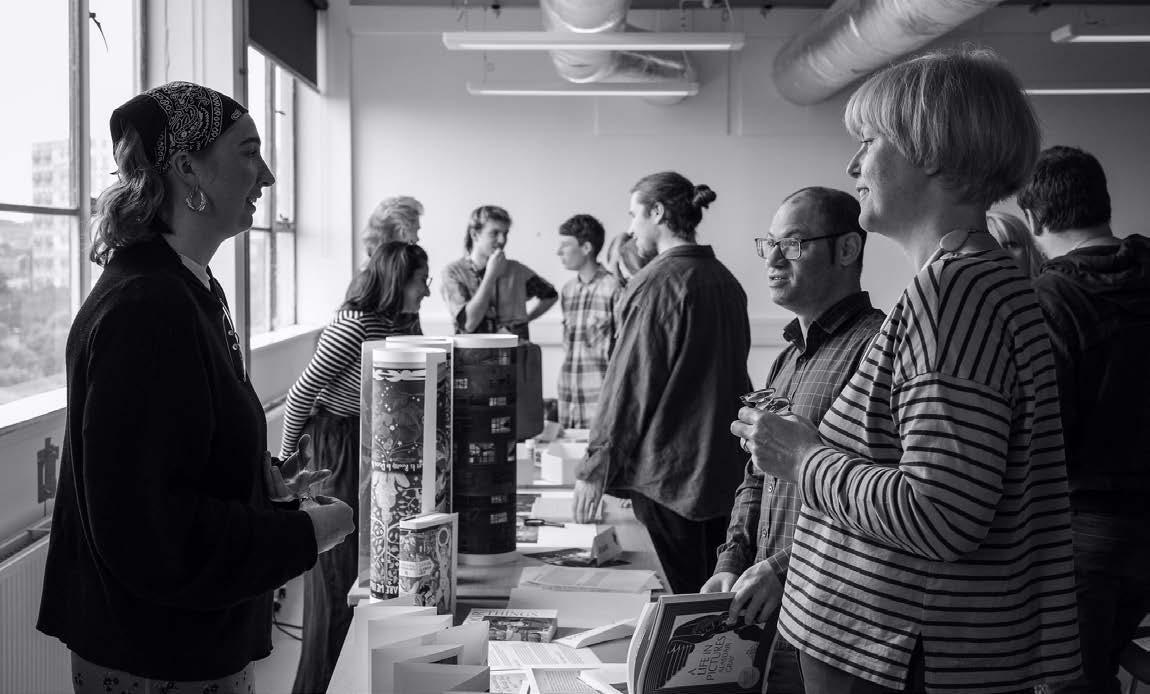 Opposite: Royal Botanic Garden Edinburgh © Cameron Brisbane for the British Council
Opposite: Royal Botanic Garden Edinburgh © Cameron Brisbane for the British Council
6
SGSAH CDA researcher Lauren Forde presenting research on Gray’s Disappearing Glasgow at The Travelling Archive Workshop by The Alasdair Gray Archive © Alasdair Watson

7
Partnership PhDs
Bilyana Palankasova
Collaborative Doctoral Award
Valuing Festivals as Incubators of Digital Creativity: Capturing the Process of Commissioning and Presenting Digital Art
HEI: University of Glasgow
Partner Organisation: NEoN Digital Arts

8
This collaborative PhD project between the University of Glasgow and NEoN Digital Arts, begun in 2020, explores the histories and methods of exhibiting digital art at festivals and the role of these organisations in the processes of institutionalisation of emergent creative practices.
Bilyana’s project considers the organisational records of digital arts festivals to uncover curatorial and programming methods specific to art and technology and the festival as a cultural form. It explores art practices which both use digital technology as their medium and critically examine the role of technology in society –specifically the relationship of such practices to institutional discourses in the artworld and the methods of exhibiting emergent practices outside of traditional institutional contexts.
Through a curatorial lens, this practice-led project combines ethnographic, archival, and curatorial methods to articulate how festivals generate value by platforming emergent practices and the importance of festivals for the history of art and institutionalisation of digital art. Reflecting on organisational and curatorial shifts at festivals, the project considers their programmes through the lenses of transdisciplinary collaboration, value generation and institutional transformation. The research engages with several partner organisations including two former UK festivals (now organisations with year-long programmes) - NEoN Digital Arts (Dundee, Scotland) and FutureEverything (Manchester, England).

9
Bilyana Palankasova
Nelson Correia Applied Research Collaborative Scholarship
Film Bang: Communities of Practice, Cross-Media Interconnections, and Sectoral Growth within Scotland’s Film and Television Industries
HEIs: Edinburgh Napier University; University of Edinburgh
Partner Organisation: National Library of Scotland Moving Image Archive
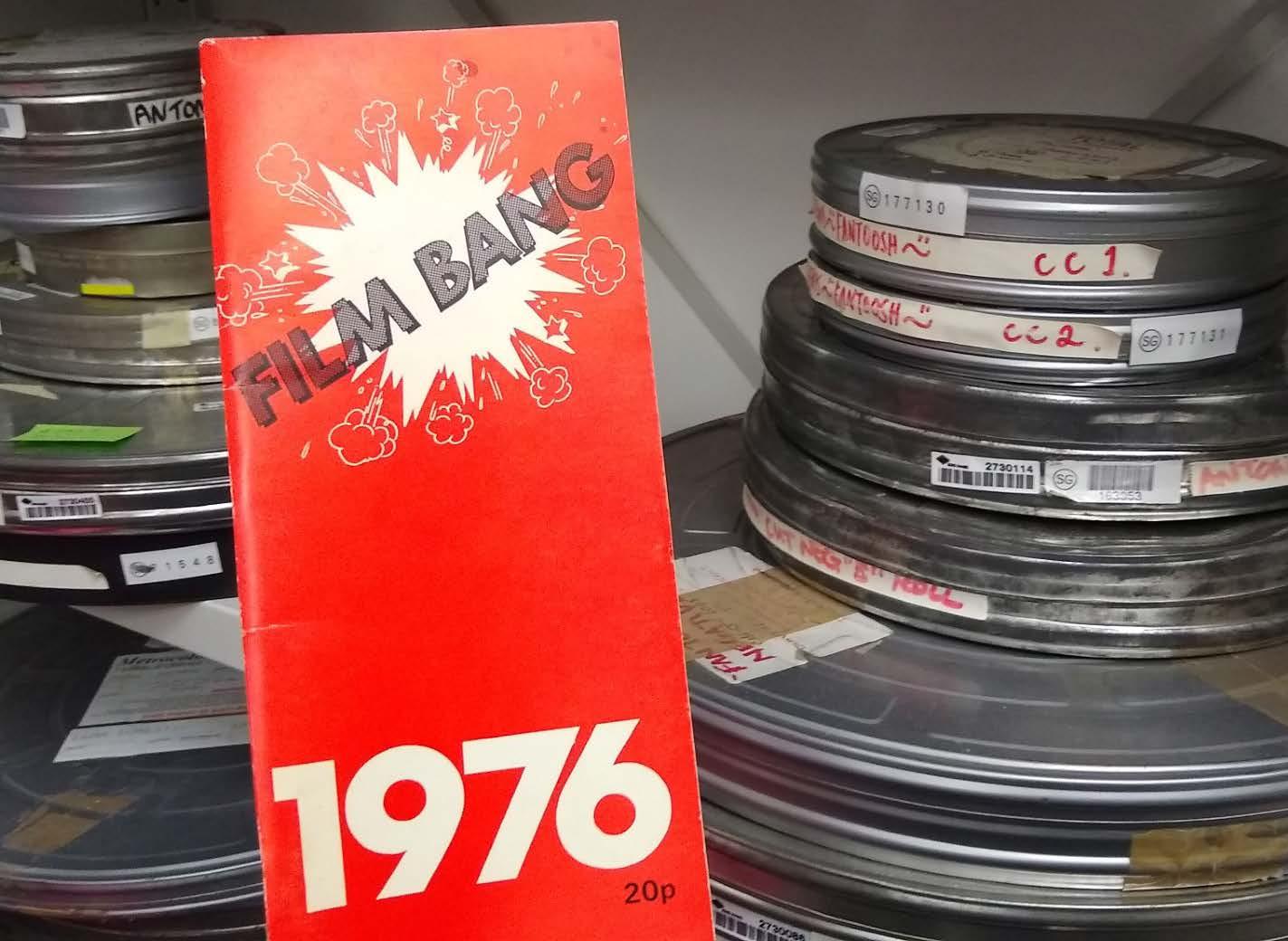
10
This collaborative PhD between Edinburgh Napier University, the University of Edinburgh and the Moving Image Archive of the National Library of Scotland (NLS) investigates the development of the freelance film and television workforce in Scotland over the last half-century.
The research, started in 2021, draws on archival materials and video-recorded oral history interviews with Scottish-based freelancers in various technical and craft roles, to understand their career journeys and strategies for career sustainability. The project comes at an exciting time for the Scottish screen sector, given its increasing economic value and international visibility in recent years.
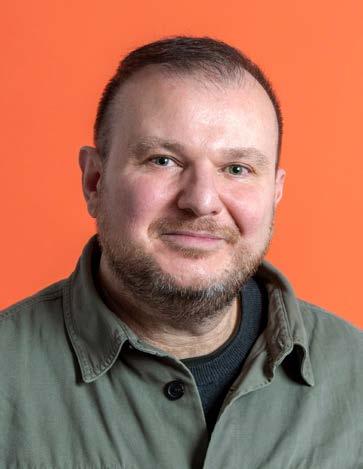
Nelson comments: ‘There is little research on the working lives of technical and craft professionals who form the backbone of the industry. This project will offer new insights into the workings of the sector from the viewpoint of practitioners and inform future strategies for local talent development and skills retention.’
The project is also helping with the preservation of Scotland’s screen heritage. Through the partnership with the NLS, the interviews recorded during the research will be added to the Moving Image Archive permanent collections for long-term preservation and public access.
Kay Foubister, NLS Acquisition Curator and project supervisor adds: ‘The opportunity to collaborate in this project to gather contemporary testimonies from a wide range of technical and craft skillsets will immeasurably enhance our existing oral history collection for future researchers and the understanding of the evolution of screen production practices in Scotland over the last 50 years.’
11
Nelson Correia
Engagement Fund
In 2022-23, over 60 of SGSAH’s doctoral researchers were awarded funding from the Engagement Fund to undertake Visiting Doctoral Researcher opportunities, as well as field trips and archival visits, create artistic works, develop their skills, and generate knowledge exchange and impact.
Maitrayee Roychoudhury, who is doing her PhD in English at the University of St Andrews, was awarded Engagement Funding to visit the National Archives of India in New Delhi. This visit is informing her thesis on the evolution of the nineteenth century female detective in popular fiction from the UK, India and Australia. Being able to access local materials was important to her research, with this trip enabling her to view relevant collections, as well as visiting numerous other museums and archives including the National Railway Museum in Dehli, Heritage Transport Museum in Taoru, National Memorial Museum and Library and the Sahitya Akademi, both in New Dehli.
Josh Smith is a PhD researcher at the University of Stirling, working on political readers and reading in early-nineteenth century subscription libraries. He was funded though the Visiting Doctoral Researcher scheme to undertake a 3 month placement at the International Center for Jefferson Studies (ICJS), Monticello, Virginia. Not only did he benefit from supervisory expertise and support from leading political scholars in the US, he also had access to books and archival records relevant to his thesis unobtainable in the UK.
12

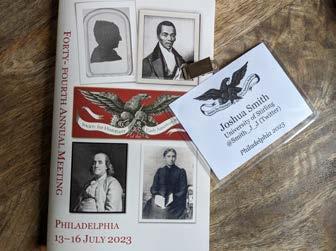


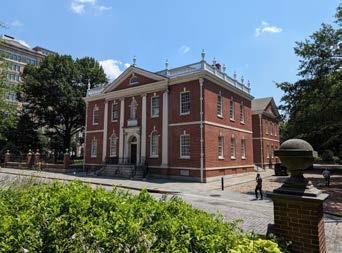



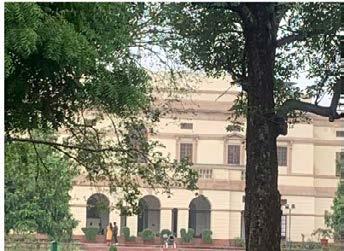
13
Cohort Development Fund
The SGSAH Cohort Development Fund (CDF) supports unique initiatives directed towards both disciplinary and interdisciplinary training needs of doctoral researchers in the Arts & Humanities. The fund is open to PhD researchers across our HEI members and enables them to review and address gaps in current training provision across the sector.
Working on a CDF application gives doctoral researchers the opportunity to expand their professional networks and develop their skills in grant writing, teamwork, budgeting, event planning and delivery and report writing and evaluation.
The CDF encourages the creation of new collaborations between HEIs, new interactions with organisations outside the academy and new transnational connections. CDF activities are collaborative, innovative and accessible in scope. They are also free and open to all Arts & Humanities PhD candidates in Scotland.
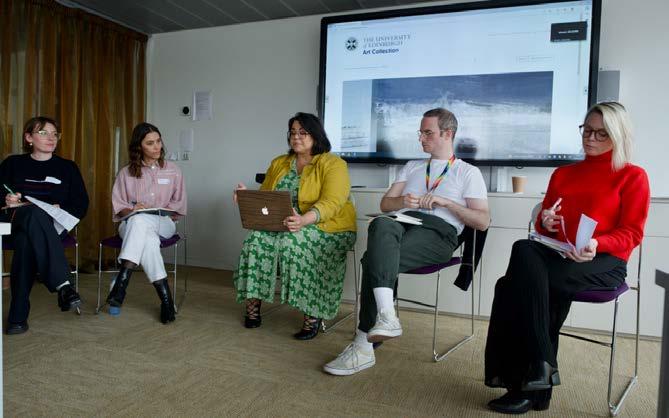

In the past year, we have funded a wide range of online, hybrid and in-person CDF activities involving over 250 participants from 17 HEIs.
Past events include:
• Unlearning and Relearning: Exploring and Contributing to Decolonial Methodologies – a series of interdisciplinary workshops to explore decolonisation and decolonial methodologies. The workshops took place as part of the PGR conference Postcolonial Fault-lines and the aim of the workshops was to bridge the gap between academia, art and activism by bringing together creative, academic and activist forces of decolonisation in theory and practice.
• Cultivating Subversion through Feminist Contemporary Art Collecting at Edinburgh College of Art – a symposium bringing together scholars, art professionals and doctoral researchers to explore a largely under-theorised subject: feminist contemporary art collecting practices. Through case study presentations, roundtable conversations and discussions, this symposium ambitiously sought to answer questions such as: Are feminist art collecting practices possible? What kinds of material and ideological infrastructures are necessary for feminist collections to exist? And: How can we build future art collections (and institutions) differently?
Ash Charlton, Jeehan Ashercook and Shruti Shukla, organisers of Unlearning and Relearning
14
Cultivating Subversion through Feminist Contemporary Art Collecting at Edinburgh College of Art © Camila Cavalcante
‘Cohort Development Funding allowed our team to bring together an incredible group of scholars and leaders in the cultural sector for Cultivating Subversion through Feminist Collecting at Edinburgh College of Art, a day of stimulating knowledge exchange. We feel certain that the connections we made planted the seeds for exciting future projects and partnerships.’
 of
of
15
Post-screening conversation with Sweatmother and Chizu Anucha, Cultivating Subversion through Feminist Contemporary Art Collecting © Camila Cavalcante
15
Lexington Davis, PhD Candidate University
St Andrews
AHRC Postdoctoral Fellowship Scheme
In the last year, SGSAH was able to offer short-term Postdoctoral Fellowships to SGSAH AHRC DTP1 alumni, in particular recognition of the challenges presented by Covid-19, and to enable recipients to realise the full potential of their original funding awards.
Our 14 recipients took up their Fellowships at one of the SGSAH AHRC DTP1 HEIs (Aberdeen, Dundee, Edinburgh, Glasgow, Glasgow School of Art, St Andrews, Stirling, Strathclyde) between January and September 2023.
This one-off Fellowship Scheme was used to provide our DTP1 alumni the opportunity to pursue their chosen Arts & Humanities research goals. The Fellowships saw some researchers, including Hannah Laurens and Mika Schröder, returning to their alma mater as an AHRC Postdoctoral Fellow to build on their primary research. Other Fellows, such as Richy Carey and Marcus Jack, used the award to initiate new enquiries into their field. Kiefer Holland and Tim Penn were among those who worked on converting their thesis into a monograph, while Stefana Djokic and Kate Wilson used the Fellowship to conduct further archival work and organise educational events.
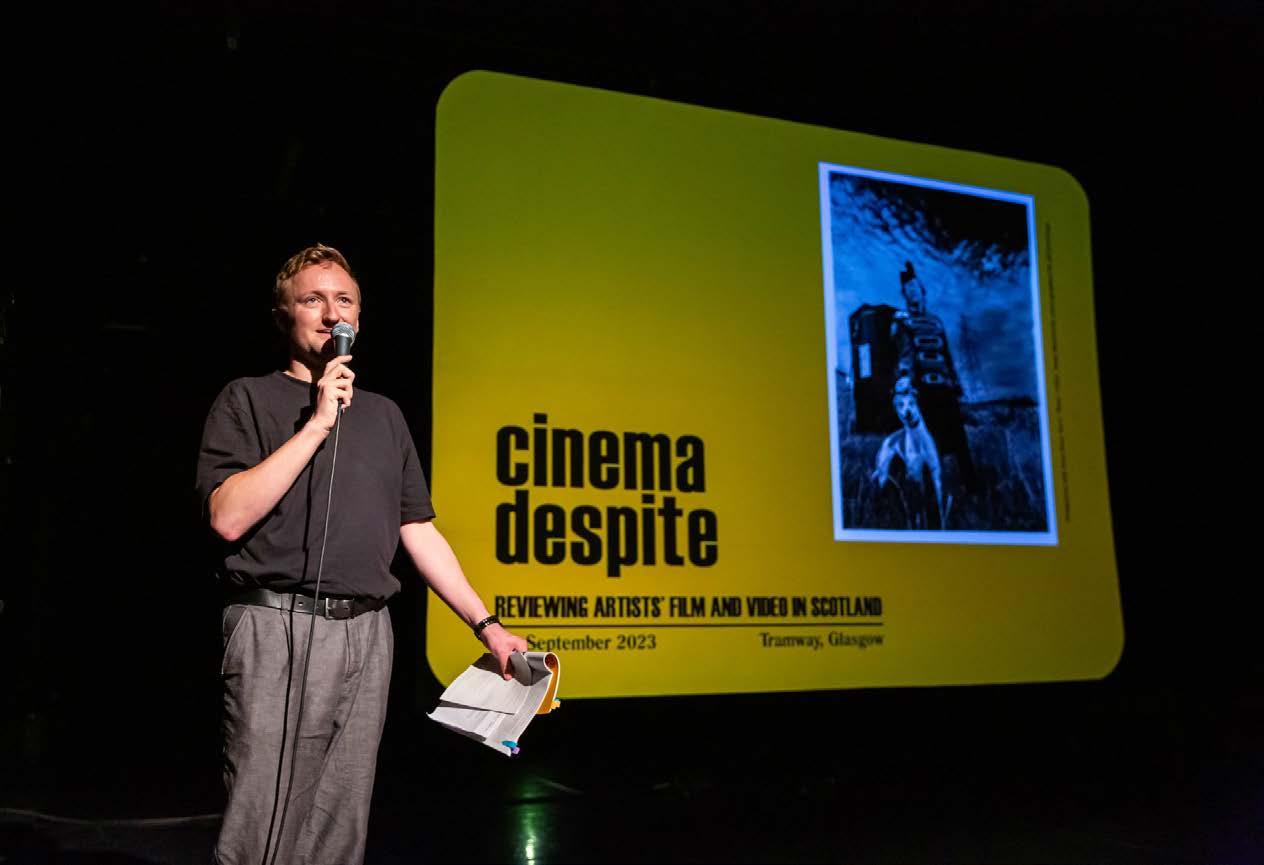
16
Marcus Jack giving the opening speech at CINEMA DESPITE – a festival curated in partnership with Tramway, Glasgow © Erika Stevenson
‘The AHRC Postdoctoral Fellowship Scheme has been a most welcome enhancement to my academic profile. The generous scheme was an ideal opportunity to make contributions to my chosen department and to integrate into the community of established scholars within my field.’
Dr
University of Edinburgh
17
17
Robert Fell
Events & Training Spotlights
Much of SGSAH’s activity is focused on delivering innovative and supportive training for PhD researchers in the Arts & Humanities. This training takes place via our Discipline+ Catalysts and our Knowledge Exchange (KE) Hubs, but every year we also work in partnership to offer additional opportunities.
We continued our very successful writing retreats at Hospitalfield, and also reintroduced a set of nine residencies for creative practice researchers at Cove Park - an inspirational setting for making and thinking. With the awareness that many of our cohorts have missed out on residential opportunities over the last few years, we also held a writing retreat for third and fourth year PhD researchers on the Isle of Cumbrae in April 2023, as well as our annual wellbeing and research-sharing residential for our first year cohort in August.
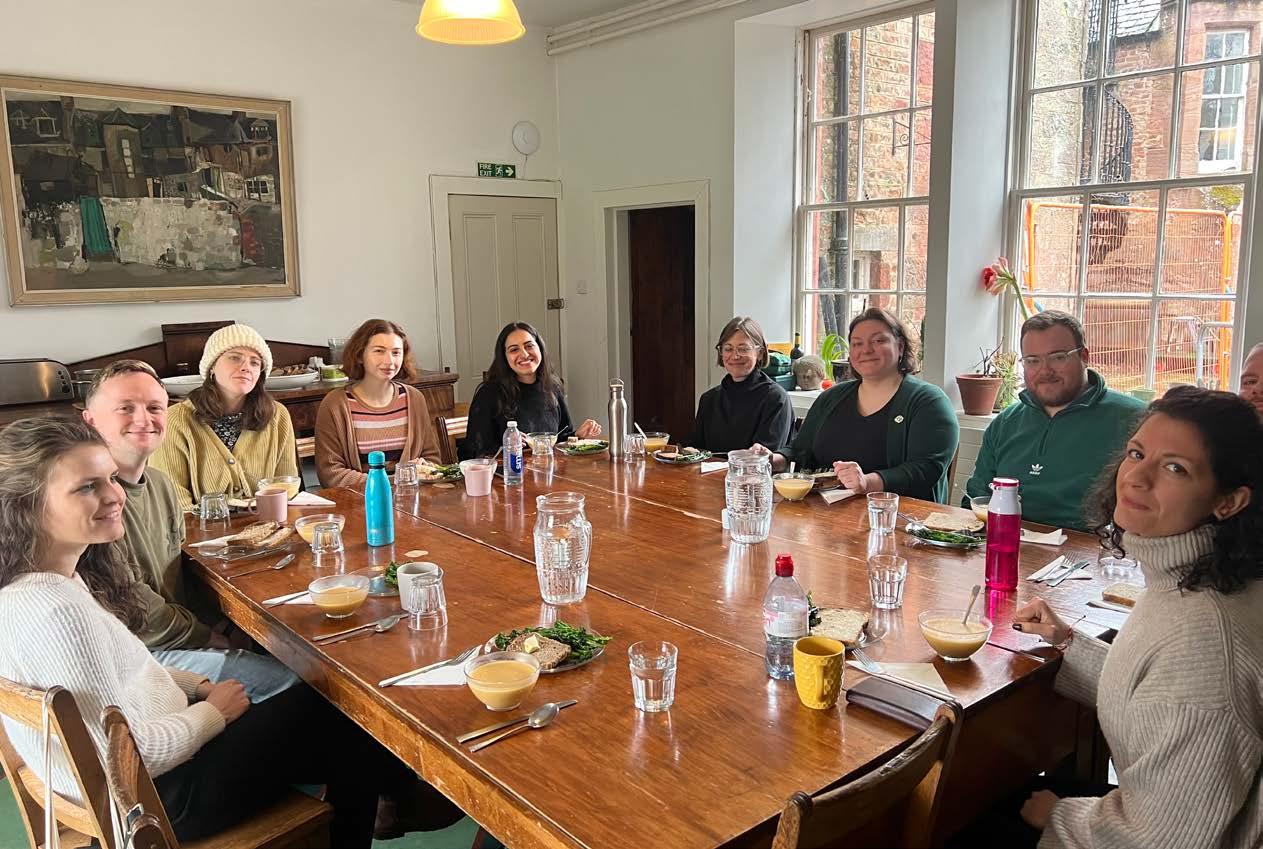
18
We built on our existing collaborative Black History Month programme in October 2022, offering 4 online lunchtime sessions. The full and varied programme included talks from nine doctoral researchers from AHRC/ESRC Doctoral Training Partnerships across the UK, with a special introduction from the Coalition for Racial Equalities and Rights, and a keynote from Dr Shelly-Anne Gajadhar, founder and CEO of Alphastute LLC.


 Cove Park © Ruth Clark
A guided tour of the Pathfoot Gallery, University of Stirling, during the Year One Residential
Cove Park © Ruth Clark
A guided tour of the Pathfoot Gallery, University of Stirling, during the Year One Residential
19
Left: A group of researchers having lunch together during a SGSAH-funded writing retreat at Hospitalfield, Arbroath
Discipline+ Catalysts
As in previous years, our eleven Discipline+ Catalysts – spanning all arts and humanities disciplines and subdisciplines – offer highly specialised training in methodological, empirical, theoretical, and thematic areas.
The training events represent the breadth and diversity of arts and humanities research, whilst also engaging with the specific context of Scottish academic life. The Catalysts delivered diverse sessions, ranging from a four-part series on ‘Descriptive Bibliography: A Course in Studying the Material Book’ (Literature Catalyst), through to highly specialised sessions, such as ‘R for Social Media Research in Cultural and Museum Studies’ (Cultural and Museum Studies Catalyst), and ‘Writing Historical Biography’ (History). Drawing on the expertise of world-renowned French thinker Etienne Balibar, the Literature Catalyst delivered the workshop ‘The Future of Racism: A Theory Workshop with Etienne Balibar’. Recognising the changes to academic research in the context of the Covid-19 pandemic, the Media, Communications, Film and TV Catalyst ran a workshop exploring archival research‘Back to the Archive: Engaging with Collections in the Wake of the Pandemic’.
Beyond distinct disciplinary alignments, the Literature and Creative Arts and Design Catalysts collaborated on a networking event supporting doctoral researchers interested in ecological concerns - ‘Ecocriticism Publishing Network Lunch with publisher John Miller at the BASN Conference’. Further addressing the climate emergency in an interdisciplinary manner, the Modern Languages Catalyst delivered the ‘Public Humanities for a Drowning World’ symposium. Building on existing research initiatives the Theology, Divinity & Religions Catalyst ran the ‘Scottish University Biblical Studies Postgraduate Day Conference’. Understanding the importance of employability, the Law Catalyst offered doctoral researchers an opportunity to learn from colleagues through the networking session ‘IntERConnecting: A Chat with ERC Scholars on Interdisciplinarity in Legal Research’. Similarly, the Creative Arts and Design Catalyst provided a valuable platform for discussion of the distinctive experiences of practice researchers through the ‘How Best to Know: The Role of Not Knowing in PhDs by Practice’ event.
20

Entangled Methods – a practical workshop led by the Creative Arts & Design Catalyst © McAteer Photo 21

22
The Scottish Parliament is one of SGSAH's KE Hub partners, and this year hosted a networking event for researchers interested in careers in government at its iconic building in Holyrood © Maike Dinger
Knowledge Exchange Hubs
SGSAH’s Knowledge Exchange (KE)
Hubs are focused on training and networking to aid PhD researchers’ future career paths outside academia and facilitate research with external partners and sectors.
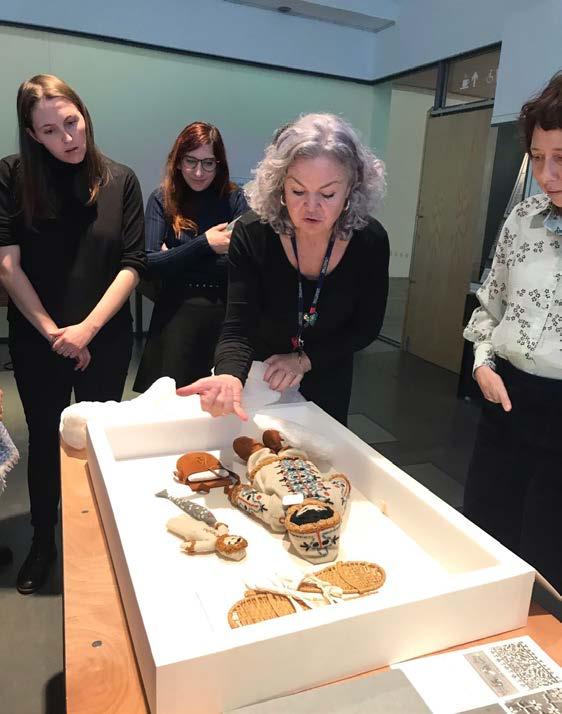
The KE Hubs, focused on the themes of Heritage, Creative Economies, and Citizenship, Culture and Ethics, work in direct collaboration with multi-sectoral partners across the UK including the BBC, British Council, Built Environment Forum Scotland, Creative Scotland, Historic Environment Scotland, National Trust for Scotland, the Scottish Parliament, and the V&A. The KE Hubs are led jointly by expert academics and representatives from the external organisations, and work to implement an ongoing programme of professional skills training and help build meaningful connections between doctoral researchers and sectors outside of academia.
The KE Hubs create and coordinate around seven events each year with participation from over 400 doctoral researchers. Events for this year included our popular annual broadcasting training session where students pitch ideas to commissioners at the BBC, and a Heritage Hub workshop ‘It’s Complicated: Complex Approaches to Museum Collections’ exploring approaches to engaging with museum collections against a backdrop of challenging social change. The KE Hubs also come together every year to deliver a collaborative, cross-disciplinary symposium; this year the theme was the Fair Work agenda. The event featured a diverse range of contributors from organisations including Creative Scotland, the Scottish Council for the Voluntary Sector, the Museums Association, the Carnegie Club and Glasgow Women’s Aid, plus current and recent doctoral researchers, to explore questions around future working models, precarious contracts, rural working and geographical issues, portfolio careers, freelancing and inclusive leadership.
23
It’s Complicated: Complex Approaches to Museum Collections – a workshop led by the Heritage Hub in partnership with Paisley Re-imagine at The Glasgow School of Art © Aude Campbell Le Guennec
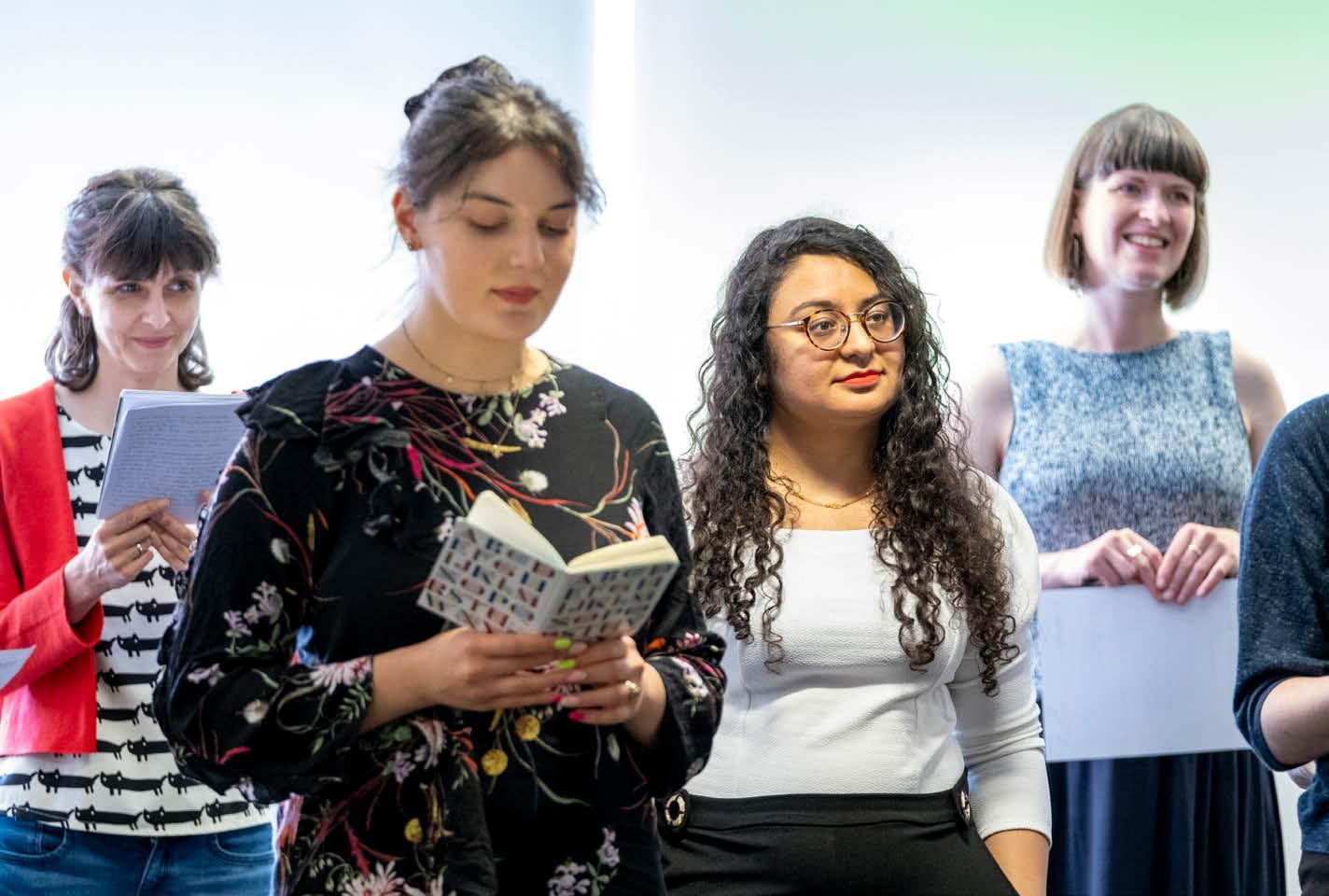
Summer School Attendees at our hybrid Summer School Hours of instruction Sessions 15 online, 16 in-person
544 84 31 24
© McAteer Photo


‘I really enjoyed attending the SGSAH summer school in person this year! I truly benefitted from connecting with my peers and genuinely enjoyed all of the sessions I attended.’
‘Amazingly insightful event that really helped with writer’s block and thinking outside the box.’
‘I found the engagement with creative work in an academic context to be absolutely life-changing.’
© McAteer Photo
25
© McAteer Photo
Research Showcase
Each year, SGSAH hosts a Doctoral Researcher Showcase to illustrate and celebrate the innovative research being undertaken by Arts & Humanities PhD researchers across Scotland.
For 2023, we brought to city-centre venue The Studio in Glasgow seven diverse projects with exhibits spanning from live Scottish botanicals to vintage screen-printed silk, and from South American Arpilleras to a theatrical performance. The featured researchers showcasing their projects this year were:
• Adam Benmakhlouf (University of Dundee) with a live performance of an experimental work, Magenta Velour Glove
• Jenny Elliott (University of Edinburgh) with a site-specific pop-up exhibit looking at practitioner-reported barriers and opportunities for greener, healthier UK public spaces
• Storm Greenwood (Glasgow School of Art) displaying art work and florals inspired by 19th century botanical artist Marianne North

• Yujia Jin (University of Glasgow) presenting a series of collages based on representations of seven Renaissance artistic figures
• Verónica Márquez Moreno (University of Edinburgh) with a selection of Chilean Arpilleras tapestries, showing the perspective of the daughters of exiled children

• Mhari McMullan (Glasgow School of Art) exhibiting new printed fabrics with patterns from the historic textile collection of Paisley Museum
• Sonali Misra (University of Stirling) with an interactive display ‘Words and Borders: Cartelisation of English-language Trade Book Publishing’
Yujia Jin © McAteer Photo
26
Mhari McMullan © McAteer Photo

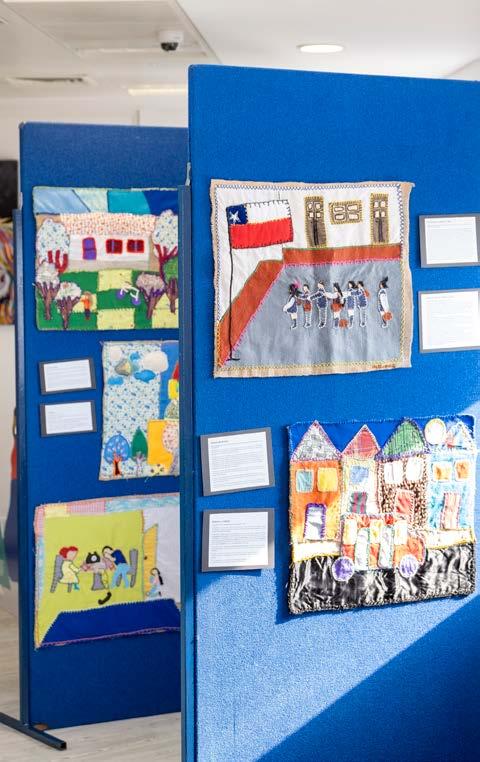
‘SGSAH’s Research Showcase this year gave me an indispensable platform (and greatly appreciated resources) to premiere a new edit of my experimental performance. I was particularly moved by how open, adaptable and genuinely enthusiastic SGSAH were towards my quite idiosyncratic pitch! SGSAH’s trust and support have contributed immeasurably to my belief in my work. I’m so grateful to have been given this opportunity.’
Adam Benmakhlouf Researcher and exhibitor
Adam Benmakhlouf © McAteer Photo
27
Verónica Márquez Moreno © McAteer Photo
Equality, Diversity & Inclusion
At SGSAH, we recognise that certain students face unfair structural barriers when it comes to accessing Higher Education and, even though they are fully capable of producing interesting, important and original doctoral level research, are discriminated against in myriad ways. To tackle this, SGSAH launched a range of new EDI initiatives this year, with many more to come.
On 5 July 2023, we ran our first pipeline summer school for potential PhD applicants. Called ‘Leap into a PhD’, the day was designed to help demystify the SGSAH application process. Attendees heard from experienced panel members who read and evaluate applications in our studentship schemes, and from current and former SGSAH-funded PhD researchers.

We have also launched an applicant mentoring scheme where 3rd and 4th year SGSAH PhD students pair up with applicants and support them through the application process. It is open to anyone who is applying for SGSAH funding in 2024 and has faced structural barriers through Higher Education and is designed to help support mentees to produce as strong a PhD funding application as possible.
SGSAH has a part-time PhD student network where students can meet and share ideas about negotiating the distinctive challenges of doing a part-time PhD. The network includes dedicated activities at our events, creating and collating shared resources for advice and support, and greater opportunities for connecting and exchanging ideas, experiences and knowledge. Looking to the future, we are also revisiting and adapting our application scoring system with EDI in mind, as well as designing and implementing an EDI code of practice.
Opposite: Dundee Contemporary Arts © The Courier
28

29
SGSAH in the World
SGSAH has been particularly active on the global stage this year.
The British Council Scotland EARTH Scholarships brought thirteen international researchers to Scotland in 2023, and our SFC Saltire Emerging Researcher Scheme for the Arts & Humanities culminated in an event in Edinburgh in November 2022, which brought together incoming and outgoing researchers from Scotland to Europe and vice versa. Our developing Global Connects International Programme furthers our reach, with an exciting set of interdisciplinary programmes delivered in partnership with HEIs in Australia, Canada and Italy.
At the same time, SGSAH funding has enabled PhD researchers to undertake short research internships and artist residencies with external organisations in Scotland. These opportunities (which are available for both SGSAHfunded and non-funded PhD researchers) give participants insight and experience working with a range of organisations and environments. Such internships and residencies develop PhD researchers’ skills and networks, leading to enhanced career opportunities and knowledge frameworks.
 A field trip for EARTH scholars in Glencoe, Scotland © Benjamin Ong
A field trip for EARTH scholars in Glencoe, Scotland © Benjamin Ong
30
Global Connects International Programme
Building on previous international training initiatives, this year we extended Global Connects to provide wider access over several months between May and September 2023.
The SGSAH British Council funded EARTH scholars presented their research at a Global Connects symposium, speaking about the role that Arts & Humanities have in facing up to climate challenges.
Global Connects also supported three separate interdisciplinary programmes, including ‘Prospectives 2023 Research Methods into Arts and Social Practice: Visual Arts, Sound and Activism’ with University of Abertay, Robert Gordon University and Sapienza University of Rome; ’Ghosts in the Machine: Using Web Archives for Humanities Research’ with University of Edinburgh in partnership with the University of Toronto; and ‘International Scar Tissue, Interdisciplinary Practice-Led Research in Melbourne and Dundee’, led by the University of Dundee with the University of Melbourne and Victoria College of the Arts, Melbourne.
 Maja Zeco, Silencer © Matt Cawrey
Maja Zeco, Silencer © Matt Cawrey
‘The event was an exceptional opportunity to meet international students and colleagues and explore transferable practice-based research methods. The interdisciplinary approach was particularly interesting and helped me to familiarise myself with new international contemporary art scenarios.’
31
Prospectives 2023 participant
EARTH Scholarships
SGSAH was awarded funding from British Council Scotland in order to offer the EARTH Scholarships, a programme which enables international research collaborations between PhD and Early Career Researchers and Scottish HEIs. The overall aim of the programme is to promote the role and interventions of the environmental arts and humanities, and the arts and cultural sector, in addressing the climate emergency.
In 2023, the programme enabled thirteen scholars to travel to Scotland from Australia, Canada, India, Ireland, Mexico, New Zealand, Norway, South Africa, Switzerland and the United States for a period of up to three months. In April, they joined with thirteen Scotland-based PhD researchers for a twoweek cohort programme, in which scholars participated in workshops and site visits in Dundee, Edinburgh, Glasgow and Stirling, as well as travelling to Glencoe and Rannoch Moor.
Uzma Aleem, an EARTH scholar from Western Sydney University, Australia, commented that the programme has been a ‘wonderful opportunity to work with scholars hailing from various disciplines and countries here in Scotland. It has shown me the importance of collaboration in finding better and sustainable solutions to the environmental issues we face.’
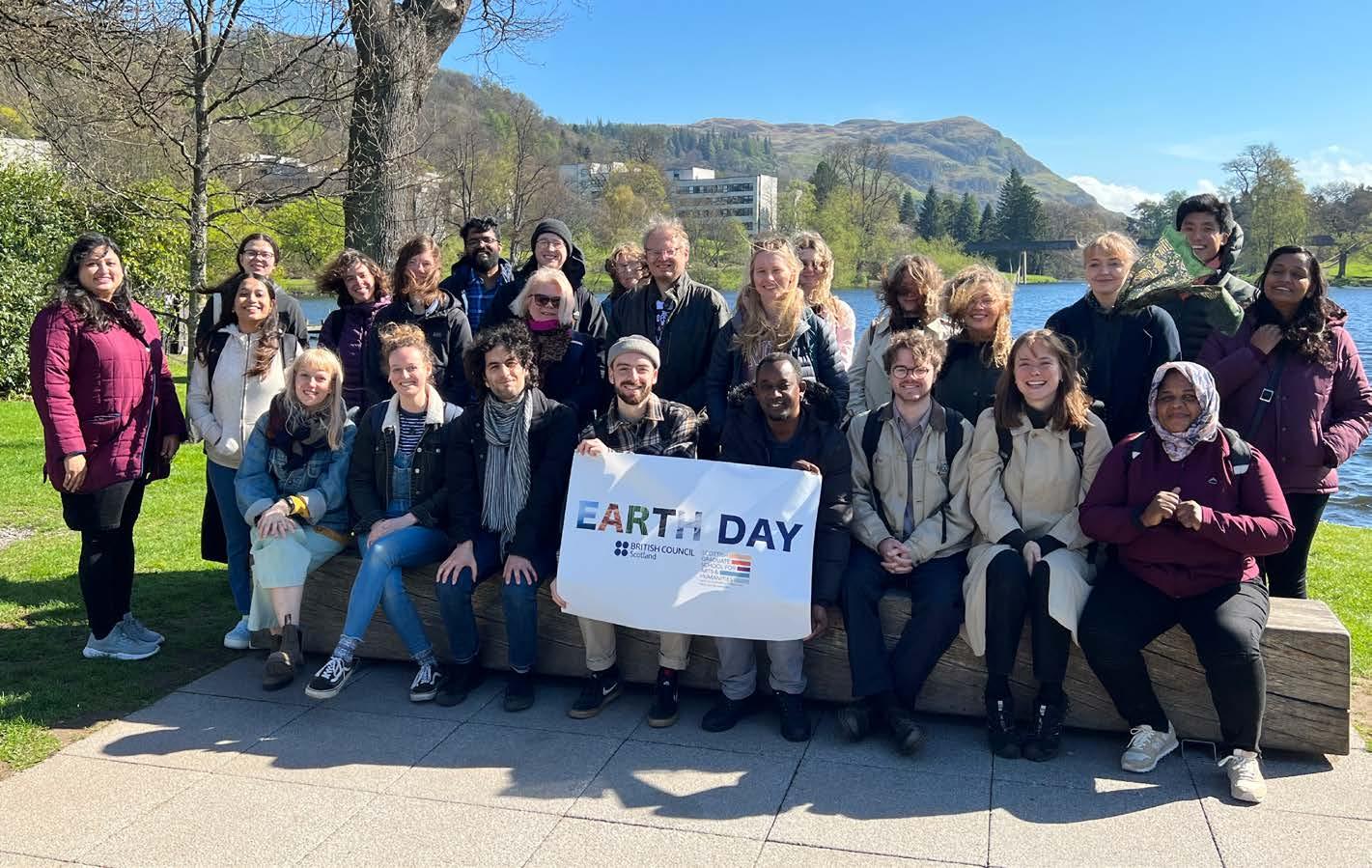 © Benjamin Ong
© Benjamin Ong
32
The 2023 EARTH scholars included:
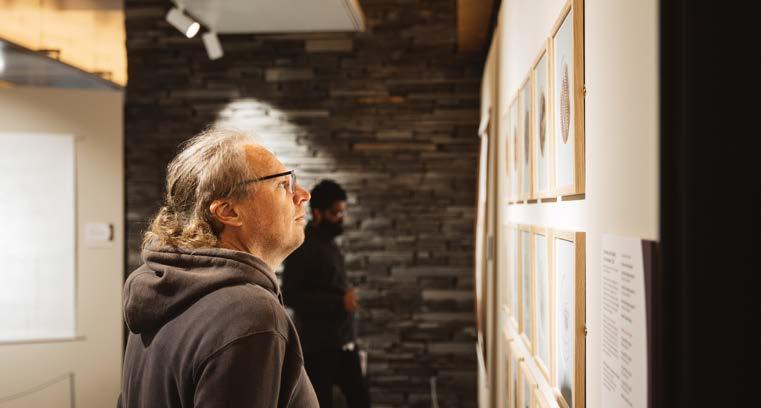

• Camellia Biswas (Indian Institute of Technology, Gandhinagar, India), who specialises in ecological anthropology, humananimal studies, disaster studies and participatory research methodologies. During her scholarship, Camellia visited and worked in collaboration with the University of the Highlands & Islands (UHI) to examine the ecological-cultural evolution of human-seal relationships in the Northern Scottish Islands across place and time to comprehend climate emergency and conservation action.
• Buhle Francis (Rhodes University, South Africa), who is pioneering collaborative scholar-activist research within ocean governance. For her scholarship, Buhle undertook a collaborative analysis project with the One Ocean Hub at the University of Strathclyde, which contributed to protecting the human rights of women who are currently trapped in a ‘wage-slavery’ system of seaweed harvesting in the Eastern Cape of South Africa.
• Aster Hoving (University of Stavangar, Norway), came to the University of Glasgow for her scholarship, where she investigated waves as aesthetic, economic, and scientific resources. Her project explores how the ephemeral nature of waves is mediated in ecological and technological objects, particularly seashells and wave energy converters. The project included fieldwork across Scotland, at an artistic research hub, a marine energy centre, and a scientific museum.
Above © Cameron Brisbane for the British Council 33
Research Internships & Artists Residencies
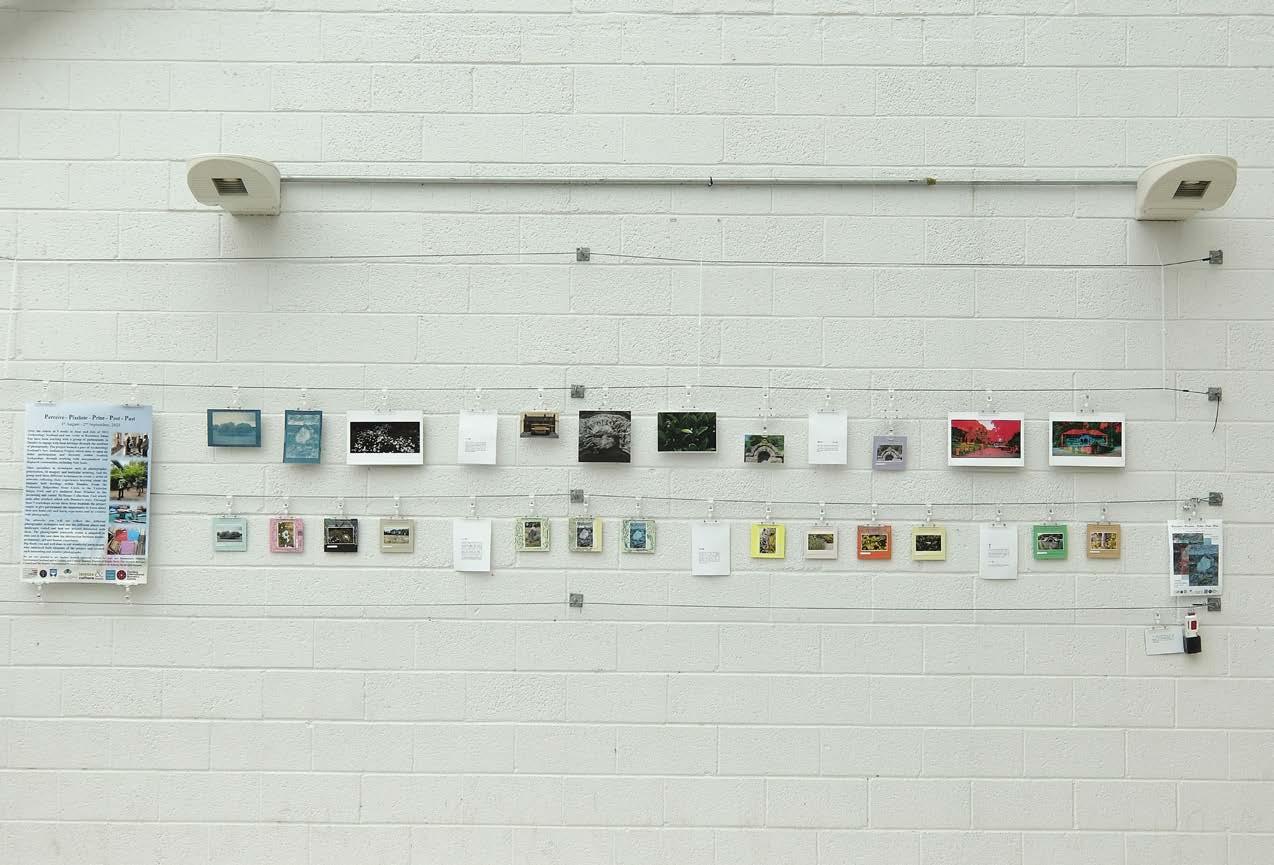
SGSAH organises and funds research internships and artists residencies for PhD candidates to spend up to three months at a partner host organisation, enabling them to enhance research and professional skills in a wide variety of contexts.
These exciting opportunities offer the chance to make a tangible difference to an organisation, whilst developing the researchers’ skills and networks outwith academia.
This year SGSAH's funded internships include at galleries in Manhattan, the Netherlands, London and Aberdeen; in archives in Florence, Berlin, Budapest and Skye; at historic houses across the UK; and with a festival in Orkney.
Photographic showcase by Sihao Fan for the New Audiences Project with Archaeology Scotland
34
Sihao Fan
Project: Art & Archaeology – Widening Participation through Creative Dialogue
HEI: DJCAD, University of Dundee
Internship Host: Archaeology Scotland
In May 2023, Archaeology Scotland welcomed Sihao Fan as a SGSAH-funded intern and team member for a three-month placement. Sihao, an artist originally from China, is currently pursuing a practice-based PhD at DJCAD, University of Dundee. His own research involves taking photographs that capture both the structures of buildings and human activity happening within them.
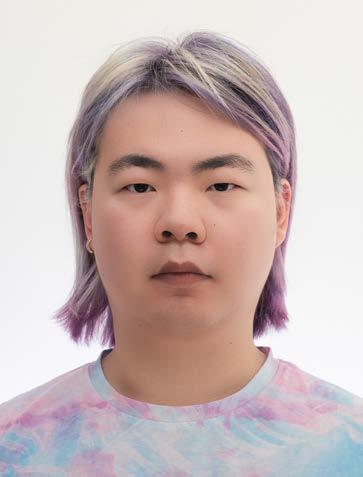
His project with Archaeology Scotland involved exploring new audiences, taking a collaborative and interactive approach to building creative dialogue, including using tours, photography and photographic archives to open conversations and foster a stronger connection between participants and their local archaeological heritage.
Sihao, as a new resident of Scotland, has used aspects of this methodological approach while learning about Scottish culture and integrating into the local community.
Kieran Manchip, Project Officer for Archaeology Scotland and supervisor of the project commented that ‘the internship offered opportunities for us to explore new skills and methods relating to art and archaeology, helping widen participation and access to heritage and art. Sihao was a pleasure to work with and worked so well with the project participants, tailoring his artistic approach and skill to the goals of the project.’
35
Sihao Fan

© GSA Archives and Collections 36
Kiah Endleman Music & Molly McCracken Project: Researching GSA’s Archives
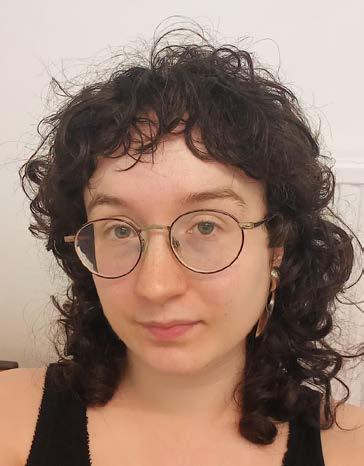
HEI: University of Glasgow; University of Edinburgh
Internship Host: Glasgow School of Art

Archives and Collections
The Glasgow School of Art’s Archives and Collections holds a rich variety of artefacts illustrating the history of the world-famous institution, and the lives and careers of its graduates, since it was established in 1845. This three-month internship project sought to use items from the Archives and Collections as case material to undertake in-depth research into hitherto unexplored areas of the collection.
Kiah, whose PhD is in Creative Writing, used the collections as the starting point to attempt to locate a community of Jewish artists within the archives. Molly, an English Literature scholar, focused on the representation and contribution of women at Glasgow School of Art. As part of the placement, they worked together to research, curate and install an exhibition ‘Pastimes’, looking at former students’ extracurricular activities and offering a behind-the-scenes glimpse into student life across the GSA’s history. Arranged around ephemeral items including event posters, programmes and amateur photographs, the exhibition showcased the rich and lasting contributions students have made throughout the brief span of their studies, and the wealth of diverse material spanning over a hundred years held in the archive.
Michelle Kaye, Archives & Collections Lead at GSA Archives and supervisor of the placement commented ‘It was wonderful to have Kiah & Molly join us, armed with the time and skills required, to freely research themes of mutual interest. We have benefited from their distinctive viewpoints and theoretical perspectives, and more generally from the addition of two intelligent, enthusiastic and friendly team members joining us.’
Molly McCracken
Kiah Endleman Music
37
SGSAH People
SGSAH would be nothing without its people, from PhD researchers themselves, our alumni, academic and professional services staff across Scotland, and colleagues in external organisations with whom we work closely.

This past year has seen the effective development of our Doctoral Researcher Committee (DRC), which is composed of PhD researchers (SGSAHfunded and otherwise) from across Scotland, as well as alumni members.
The SGSAH staff team has also grown, as can be seen from our staff list in the final pages. We welcomed Sam Morton to the team in March 2023, in the role of SGSAH Modern Apprentice. The next month, we were joined by Dr Anindya Raychaudhuri, seconded from the University of St Andrews, to work with us as our EDI Lead. More information about SGSAH’s EDI work is detailed earlier in this report.
© McAteer Photo
38
Our Doctoral Researcher Committee (DRC)
Since its formation in 2021, the Doctoral Researcher Committee has been ensuring SGSAH’s work represents the viewpoints and supports the needs and experience of researchers from across all our member HEIs.

Individual members sit on SGSAH’s EDI committee as well as our KE Hubs and Discipline+ Catalyst, with the group taking researcherled suggestions forward and raising SGSAH’s profile amongst non-funded students. This year the committee has supported the development of our GREEN/GRADUATE Strategy and hosted its first student surgery outreach event at SGSAH’s Summer School.
As part of our formal governance structure, the committee is also actively involved in decision-making and strategic planning, with the Chair and Deputy Chair of the DRC representing the committee’s voice on SGSAH’s Executive.
Members of the SGSAH DRC 39
Our Alumni
Since its inception in 2014, SGSAH has funded hundreds of PhD projects, behind which are talented, caring, ethical and reflective professionals. We endeavour to celebrate the accomplishments and impact of our global community of alumni and are intent on nurturing relations with them beyond their PhD.
Online engagement plays a major role in this. Beyond our social media channels, we have also been developing the SGSAH Research site (sgsahresearch.com) by adding profiles for SGSAH-funded individuals since its launch, forming a dynamic, accessible and visual online alumni showcase. These profiles are lasting records of our ‘alumni in waiting.
The growing diversity of the SGSAH alumni body boosts the voice of Arts & Humanities research in Scotland and across the globe. We are grateful to our alumni for recognising SGSAH as a valuable asset and engaging with us through various ways, such as partaking in SGSAH events, keeping abreast of our activities and providing us with updated contact details. If you are one of our alumni, we encourage you to be in touch and we look forward to hearing your news. If you’d like to keep in touch, please complete our online form which can be accessed via the ‘Alumni’ section of our website. We have also been tapping into LinkedIn as a networking resource, so please do connect with us there.

40
Kate Wilson at the Saltire Society Scotland's National Book Awards
Achievements from our alumni in 2022-23 include:
• Dr Alborz Dianat (University of Edinburgh, 2020-2023) has been offered a research position at University College Dublin and is writing a monograph entitled Walter Gropius in Britain, due to be published by Routledge. He has also been appointed Executive Editor of Architectural History.
• Dr Ollie Hicks (University of Dundee, 20162020) released their debut novel in June 2023. Grand Slam Romance (Book 1) is a queer graphic novel illustrated by their wife, Emma Oosterhous and published by Abrams ComicArts. Book 2 in the series will be released in May 2024.
• Dr Maria Sledmere (University of Glasgow, 2018-2022) was shortlisted for the Saltire Society’s Scottish Poetry Book of the Year. Her shortlisted book The Luna Erratum is published by Dostoyevsky Wannabe. Maria is Lecturer in English and Creative Writing at the University of Strathclyde and is Editor-in-Chief at SPAM Press.

• Dr Kate Wilson (University of Strathclyde, 2017-2022) was awarded the Ross Roy Medal at the Saltire Society Scotland’s National Book Awards for her PhD thesis, Current Living Places and Future Utopias: Community Writing in Glasgow, 1967-1990. The Medal is awarded annually to the best PhD thesis on a subject relating to Scottish literature.
• Dr Constantinos Yiallourides (University of Aberdeen, 2014-2017) has been appointed as Research Leader at the British Institute of International and Comparative Law (BIICL) to lead the Institute’s Watts Programme of research and training in the law of the sea and global ocean governance. He has also started a new position as tenured lecturer in International Law at Macquarie University, Sydney.
Maria Sledmere reading her poetry at the Nunnery Gallery, London
41
Our Staff
Professor Claire Squires (she/her) Director
Claire is the Director of SGSAH and is responsible to the Board for the overall vision and development of a world-leading and innovative national graduate school, targeted to the particular needs of doctoral students in the Arts & Humanities. Alongside her role as Director, Claire is Professor in Publishing Studies at the University of Stirling and Director of the Stirling Centre for International Publishing and Communication.
Professor
Deputy Director
Craig joined SGSAH in July 2020. He is based at the University of Edinburgh, where he is Professor of Interdisciplinary Design Studies. His interdisciplinary research addresses the cultural and social study of design in its broadest sense, with particular focus on informal design practices, the ethics of design, and mobilities. He has a long-standing involvement with SGSAH including as co-lead of the ‘Creative Arts and Design’ panel and Discipline+ Catalyst. In his capacity as Deputy Director, Craig has a particular responsibility for overseeing the work of the Catalysts.

Monica Callaghan (she/her)
Head of Operations and Strategy
Monica is responsible for implementing, overseeing and developing all of SGSAH’s operational strategies and processes. Monica joined us from The Hunterian where she was Head of Education and brings with her extensive leadership and strategic management experience within the cultural sector and a longterm commitment to learning and development.
Lindsay Wilson (she/her) Administrator
Lindsay leads the SGSAH administrative team. She is our key contact for students, providing advice and guidance on funding and training opportunities. Lindsay brings experience of EU funded research projects and university finance to her role with SGSAH.


 © University of Leicester
Craig Martin (he/him)
© University of Leicester
Craig Martin (he/him)
42
Helen Kendrick (she/her) Partnerships and Placements Manager

Helen joined SGSAH in 2019 after working in a range of academic and industry roles in the arts & heritage sector. She is responsible for SGSAH’s partnership strategy, knowledge exchange (KE) and careers-related training, collaborative PhDs and SGSAH’s extensive internship programme.

Jordan McInally (she/her) Administrative Assistant
Jordan joined SGSAH in 2019 and leads on the organisation and delivery of SGSAH’s many events. Jordan is responsible for providing administrative support across the full range of our work, ensuring everything runs smoothly.
Mariam Jack (she/her) Media and Communications Administrator
Mariam joined SGSAH in March 2020. Her main role is to support the implementation of SGSAH’s communications strategy. She supports the social media profile of SGSAH and contributes to a range of digital outputs and campaigns, including website content, video recordings, press releases and newsletter publications.

Dr Anindya Raychaudhuri (he/him) Equality, Diversity & Inclusion (EDI) Lead
Anindya joined SGSAH as EDI Lead in April 2023. He is Senior Lecturer in English at the University of St Andrews. As EDI Lead, Anindya is responsible for organizing events, training sessions, mentoring schemes and exploring how policies and practices can be improved.
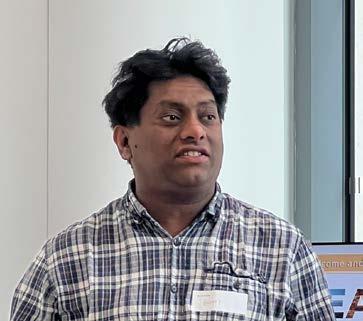
Sam Morton (he/him) Modern Apprentice
Sam joined SGSAH in March 2023. His role in the team is to provide administrative and organisational support to staff and students. In particular, his work is in facilitating travel and accommodation bookings, updating databases, event support, processing expenses and supporting SGSAH’s social media profile.

43
www.sgsah.ac.uk
admin@sgsah.ac.uk
PhD Blog
sgsahblog.com
PhD Research Showcase
sgsahresearch.com























 Opposite: Royal Botanic Garden Edinburgh © Cameron Brisbane for the British Council
Opposite: Royal Botanic Garden Edinburgh © Cameron Brisbane for the British Council
















 of
of




 Cove Park © Ruth Clark
A guided tour of the Pathfoot Gallery, University of Stirling, during the Year One Residential
Cove Park © Ruth Clark
A guided tour of the Pathfoot Gallery, University of Stirling, during the Year One Residential












 A field trip for EARTH scholars in Glencoe, Scotland © Benjamin Ong
A field trip for EARTH scholars in Glencoe, Scotland © Benjamin Ong
 Maja Zeco, Silencer © Matt Cawrey
Maja Zeco, Silencer © Matt Cawrey
 © Benjamin Ong
© Benjamin Ong














 © University of Leicester
Craig Martin (he/him)
© University of Leicester
Craig Martin (he/him)




